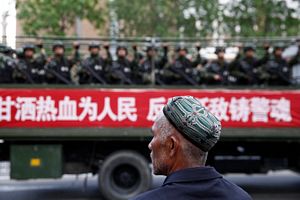In recent weeks, much of the coverage of relations between the West and China has centered on the fallout from the July 12 South China Sea decision, and understandably so. But as far apart as the West and China are on maritime issues at the moment, there remain strong efforts to pull the two sides closer together with regard to combating terrorism.
Last week, the United Kingdom added the East Turkestan Islamic Movement (ETIM) to its list of proscribed terrorist organizations. Using the name Turkestan Islamic Party (TIP)–but noting the group is also known as ETIM and East Turkestan Islamic Party (ETIP) –the British Home Office said the group, founded in 1989 by Uyghur militants in Xinjiang, aims to “establish an independent caliphate” which it dubs “East Turkestan.”
“TIP is based in the Federally Administered Tribal Areas (FATA) of Pakistan, and operates in China, Central, and South Asia and Syria,” the designation notes, highlighting that the latest attack claimed by the group in China was in April 2014 and the most recent activisties of the group have centered on Syria.
The Chinese welcomed the British designation, with Foreign Ministry Spokesperson Lu Kang saying, “Terrorism is a public enemy faced by mankind. And anti-terrorism campaign knows no borders.” Lu went on to say China “welcome moves by the international community including the U.K. to see through the terrorist nature of and real danger posed by the ETIM.”
On September 3, 2002 the United States designated ETIM under Executive Order 13224–a 2001 Executive Order issued by president George W. Bush aimed at disrupting terrorist financial networks. The UN likewise added ETIM to its list of terrorist organizations on September 12, 2002, which the U.S. Treasury Department called “an important step toward greater cooperation in Central Asia against common terrorist threats and the instability and horror that they sow.”
Notably, ETIM has not been designated a Foreign Terrorist Organization (FTO) by the U.S. State Department. (For details on the difference, see here).
The British designation, as noted above, lists recent activities by the group in Syria, not China. While Beijing blames violence in Xinjiang–such as the 2014 rail station bombing in Urumqi–on ETIM, there’s noticeable dissent globally about the group. As a 2014 backgrounder on the group from the Council on Foreign Relations says, “Experts say reliable information about ETIM is hard to come by, and they disagree about the extent of ETIM’s terrorist activities and ties to global terrorism.” In 2013, after TIP reportedly claimed responsibility for an intentional car crash in Tiananmen Square which killed five and injured 40, Shannon Tiezzi noted concerns from human rights activists who worry “Beijing exaggerates the influence of ETIM to avoid criticism for its aggressive crack-downs in Xinjiang.”
In the wake of the South China Sea decision–and the clear divide between the West and China on maritime issues–both sides are looking for steady ground in the relationship. Anti-terrorism is one potential area for cooperation, though the record is mixed so far. As noted in a recent Reuters report, China was unhappy that a recent U.S. State Department report “said there was a lack of transparency or information from China about incidents it called terrorism, and said counterterrorism cooperation was limited.”
With this–and the South China Sea conflagration–in mind, U.S. National Security Adviser Susan Rice’s recent trip to Beijing takes on further depth. Rice’s trip was seen by many as damage control, she was expected to call for calm with regard to the South China Sea. From Beijing, Rice stressed the interdependence between the United States and China and highlighted areas of cooperation and confidence building–particularly on counterterrorism. The White House called her discussions with State Councilor Yang Jiechi candid, in-depth, and strategic.
“[W]e are confronting our differences with candor and clarity and we believe that clarity produces predictability, and predictability produces stability,” Rice said
A senior U.S. administration official told Reuters, “Certainly, the Chinese did raise their concerns regarding certain organizations like ETIM and both Ambassador Rice and her counterparts had a candid exchange on that as well.”

































